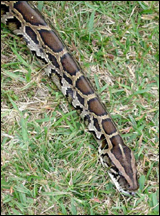
Experts from around the globe gathered on the campus of the University of Notre Dame from April 9 to 11 for the first international workshop on ways to reduce the risk from potentially invasive animals.
Non-native species invasions are a leading cause of the world-wide loss of native biological diversity and also are associated with disease risks to humans and both domesticated and wild species on which humans depend. The global costs of invasive species reach into the hundreds of billions of dollars each year, with millions of human livelihoods disrupted.
Many countries continue to suffer needlessly from the importation of alien animals like the Burmese python in the U.S. that turn out to be harmful to us and our natural ecosystems,David Lodge, director of Notre Dames Center for Aquatic Conservation, said.If the U.S. would follow the examples from many other countries and adopt modern approaches to screening out harmful species, we could solve this problem, protect our native biodiversity, and make international trade more economically beneficial.
The workshop participants will next provide recommendations to the Convention on Biological Diversity (CBD) to help prevent the introduction, through international trade, of non-native species that cause harm. Countries that are members of the CBD decided in 2006 that more efforts were required to lower the potential risks of organisms used, for example, in aquaculture, as pets, in aquariums, and as live bait.
The workshop featured 24 invited speakers from 14 countries and included experts from government agencies, relevant industries, universities and non-governmental organizations. Sessions focused on science, economics, different countriespractices, tools for sharing information, and international law.
Results of the workshop will be used by CBD member countries, pertinent international bodies, national policy makers, scientists and stakeholders in the live animal trade. The report, including a Web-based resource, will provide a broad picture of current and developing practices and tools for pre-import risk screening for a range of priorities and nations.
Organizers included the Global Invasive Species Programme, the IUCN Invasive Species Specialist Group, Defenders of Wildlife, and Notre Dames Center for Aquatic Conservation.
_ Contact: David Lodge, director, Center for Aquatic Conservation, University of Notre Dame, 574-631-6094,_ " dlodge@nd.edu ":mailto:dlodge@nd.edu
TopicID: 27386